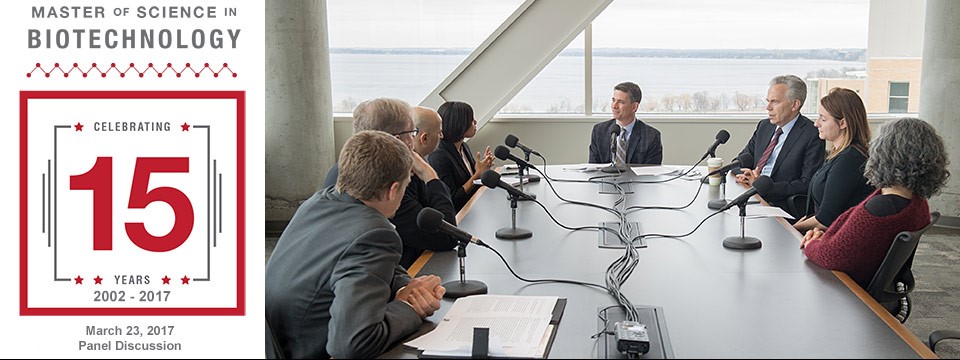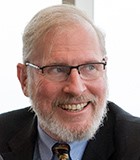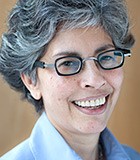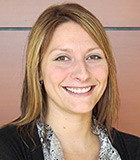The University of Wisconsin Master of Science in Biotechnology Program began with its first cohort of students in 2002, and its 14th class graduated this May, with the BTC Institute serving as a major partner since its inception. The 15-year anniversary highlights the success the program has garnered over the years, with over 300 alumni successfully completing the program between 2002 and 2017.


To celebrate and acknowledge the program’s 15-year anniversary, a panel discussion was held in March of this year on the University of Wisconsin – Madison campus at the Wisconsin Institute for Medical Research (WIMR). A panel of alumni and faculty, led by Kevin Conroy, CEO of Exact Sciences, addressed the question: What are the future education needs of the biotechnology industry in Wisconsin?

Alumni of the MS in Biotechnology Program were invited on the panel to share their experiences in the program, what drove their decisions to complete this challenging degree, and how it has impacted their professional careers. While Alana, Mike, Natalie, and Abdalla entered the program for slightly different reasons, they all agreed that completion of the interdisciplinary degree has enhanced their professional growth and career options in academia, small start-up companies, large multifaceted companies, and healthcare organizations, to name just a few.

Core faculty members of the program, such as Scott Fulton and Pilar Ossorio, offered their perspectives regarding how the curriculum uniquely prepares students for the biotechnology industry. They emphasized the applied nature of the program — the practical knowledge and skills that are fully incorporated — and the importance of local biotechnology leaders sharing their experiences and expertise with the next generation of biotechnology leaders.

In addition, the panel also addressed related issues, for example: The Wisconsin environment for entrepreneurship; what organizations assist with new company development; the future of biotechnology in Wisconsin (and globally); and, how academic research can better translate into commercial products.

Dr. Rick Moss, the Executive Director of the MS in Biotechnology Program explained the history of the program and how it was initially conceived by then Governor Tommy Thompson, and has since grown into the mature program that it is today.

The panel discussion highlighted the pivotal impact the MS in Biotechnology Program has had in boosting the biotechnology industry in Madison and Wisconsin, the Midwest, and beyond.

Audio for the panel discussion is available at the Master of Science in Biotechnology website and includes opening remarks, introductions, and answers from panel members on various topics concerning biotechnology:
www.ms-biotech.wisc.edu/15-years/

More on the program:
The program is uniquely designed for working professionals who would like to further their careers in biotechnology. It is based on an interdisciplinary curriculum that focuses on the science, law, and business of biotechnology.
Faculty represent both the academic and corporate worlds. This has allowed the program to remain extremely applied and current, and focus on the skills essential for success in global biotechnology industries, from bio-therapeutics, diagnostic testing, medical devices, research tools, bioenergy, and agricultural biotechnology.
As noted on the program’s website (www.ms-biotech.wisc.edu), it offers:
- A curriculum like no other that integrates topics in science, business, and law
- Powerful skills that bring the “big picture” of life science product development into clear focus
- Exclusive evening/weekend courses allowing students to work full-time while enrolled
- A completed executive education level degree in less than two years
Because of the interdisciplinary nature of the program, it is ideally suited for working professionals with diverse backgrounds and training: scientists, business professionals, lawyers, IT specialists, and those involved in healthcare. The strong cohort nature of the program allows students with varying backgrounds to assist each other in working on topics that they are not familiar with, including both domestic and international students.
Since the inception of the program, the BTC Institute has played an integral role in designing and delivering the three laboratory courses that are the scientific backbone of the program. The laboratory courses are designed and executed to first equip all students with the basic science behind biotechnology, before diving into more advanced scientific areas. Scientific content is paired with intense hands-on laboratory activities, ensuring that all students become comfortable and competent in the laboratory environment. The unique collaboration between the MS in Biotechnology Program and the BTC Institute has allowed the students in the program to learn about the science of biotechnology in an industrial environment, fostering both their understanding of the industry, as well as their confidence in such an environment. The access to industry scientists is invaluable as the students expand their professional networks.
The three business courses in the program focus on technology assessment, product development, and strategic growth. The students travel through the entire product development process from inception to the creation of a successful product portfolio. As most students do not come from a legal or regulatory background, courses in intellectual property, licensing, regulations, ethics, and biotechnology operations and manufacturing prepare the students for the complex world of global biotechnology.
In addition to delivering exceptional laboratory experiences for the MS in Biotechnology students, the BTC Institute also hosts special events for the program, including their annual graduation ceremony in May, new student orientation in August, and various alumni events held throughout the year. The beautiful and inviting setting of the Promega campus has provided the program with many rewarding experiences for its students
The University of Wisconsin’s Master of Science in Biotechnology Program was specifically designed for students with diverse backgrounds, allowing all to be successful in the field of global biotechnology!
For more information, please contact Natalie Betz or visit www.ms-biotech.wisc.edu.
Dr. Natalie A. Betz
Associate Director
Master of Science in Biotechnology Program
University of Wisconsin – Madison
School of Medicine and Public Health
nabetz@wisc.edu
BTC Institute
Biotechnology Faculty Associate
Natalie.Betz@btci.org
